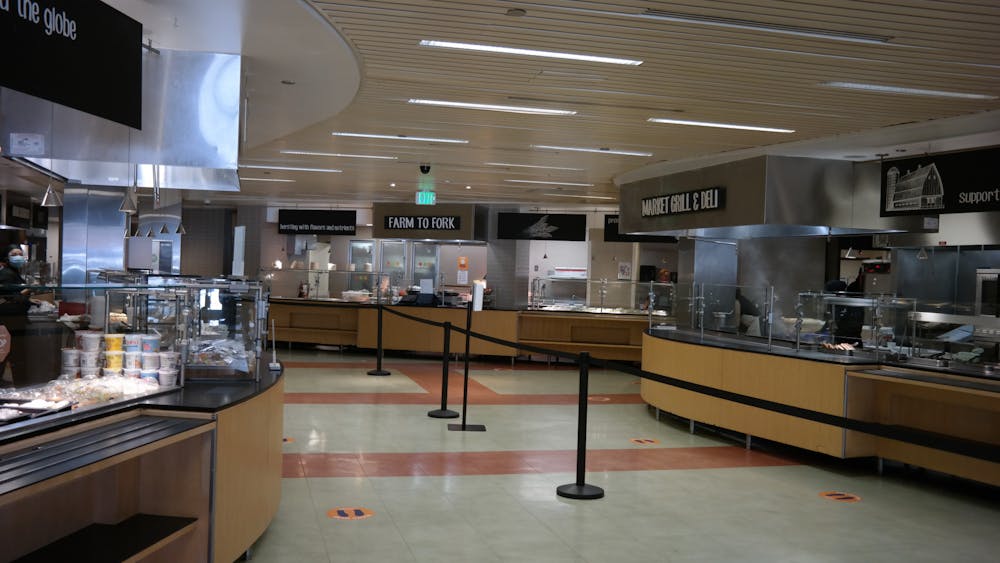Hopkins plans to shift to a self-operated dining model for the Homewood and Peabody campuses and take over operation and oversight of the new dining programs. The transition will happen during the summer of 2022 when the contract with the Bon Appétit Management Company, signed in 2013, will end.
Under the new model, the University plans to renovate its dining facilities, standardize meal plans across the two campuses and incorporate campus cafes into dining plans. Two new dining areas will also be constructed in the renovated Rec Center and the to-be constructed Stavros Niarchos Foundation Agora Institute building.
In an email to The News-Letter, Ian Magowan, senior manager of dining programs, explained that the University aims to develop closer relationships with its staff and local partners through the new model.
“Self-operating the dining program will allow for relationships with vendors, producers and operators to be held directly by the University instead of with a third-party supplier,“ he wrote. “We will work to leverage these relationships to create new educational opportunities both on and off campus.”
He clarified that there will not be any major changes to the dining locations and structures on campus during the first phase of the transition. Rather, Hopkins will use the time to focus on improving service times and methods to best meet the needs of students. Potential changes to current dining locations will be proposed once the dining staff becomes more familiar with the transition.
Sophomore Casey Levitt, an officer of Real Food Hopkins, said that the administration has met with the organization’s leaders to inform them of the dining change prior to the announcement. Real Food Hopkins is a student group dedicated to building a more sustainable food system at Hopkins.
“They told us that they really want Real Food Hopkins to have a big role in figuring what comes next for the dining department and further relationships with local and minority-owned suppliers,” she said. “We’re really excited to have a big role in reshaping what the dining program looks like in the future.”
Although Levitt acknowledged that Bon Appétit worked to implement sustainable practices on campus, she supports the University’s decision to end its contract with Bon Appétit because it is a subsidiary of the Compass Group.
“This group is one of the big three food service management companies that control the entire institutional food systems, and there are a lot of problems caused by these three campuses — from workers right abuses to environmental causes,“ she said. “These companies even have a stake in the private prison system.”
Junior Audrey Ting, president of Blue Jay’s Perch, was surprised that the University decided to move toward a self-operating model. Blue Jay’s Perch is a subgroup of Real Food Hopkins dedicated toward creating a green space that tends a community garden located at the East Baltimore campus.
“It is really cool that the University is acknowledging that this is what the student body wants. I know it’s going to be logistically challenging to source all the food ourselves rather than just contract them from an external source,” she said. “I’m proud of them for taking that step but we’ll see how the implementation goes from here.”
In its announcement, the University committed to building on the sustainable practices set by Bon Appétit and bringing local and minority-owned food businesses to campus. According to Magowan, Hopkins will continue to work on these goals with Bon Appétit during the transition period.
“We will ensure that current partnerships with local vendors are maintained and carried into the new program,” he wrote. “By reviewing the current program to influence decisions for the new, we will be able to better identify areas of need and then work to identify local suppliers who specialize in those areas.”
Hopkins began working toward improving sustainability within its dining program when it signed onto the Real Food Campus Commitment in 2013. The commitment came as part of the national movement by Real Food Challenge to encourage universities to shift $1 billion of their food budgets toward local and community-based produce that is ecologically grown and abides to the conditions of fair trade. Hopkins committed to boost “real food” on campus by 35% by 2020.
Levitt noted that the University fell shy of the goal, citing figures estimated by the Read Food Challenge, but she remains optimistic about future changes.
“The final number we got to was about 31%. The fact that almost a third of food in our dining hall is ‘real’ food is definitely a big accomplishment. Now, 2020 is over and we’re figuring out what comes next for the dining program,” she said.
Ting emphasized that the University should make implementing sustainable measures, such as sourcing foods locally and supporting the local economy, a priority.
“It is a challenge but with the scale of Hopkins and what the student body wants, it’s good for them to try,” she said. “As an organization, we want to create a green space in Baltimore and foster people’s connections to food and how their food is produced.”
Hopkins plans to offer Bon Appétit employees who are currently working as hourly dining staff similar positions in the new dining system.
“The new program structure will also bring on the entire dining front line staff as JHU employees, currently employed by the contractor; 95% of whom are Baltimore city residents,” he wrote. “We will build on their strong relationships with students and campus to increase involvement in campus and community activities.”
He also stressed that addressing food insecurity among students at Hopkins will be a priority as the University plans for the new model.
The University will hold listening sessions in the coming months to gather community input on its plans as it prepares for the transition to the new dining model.





